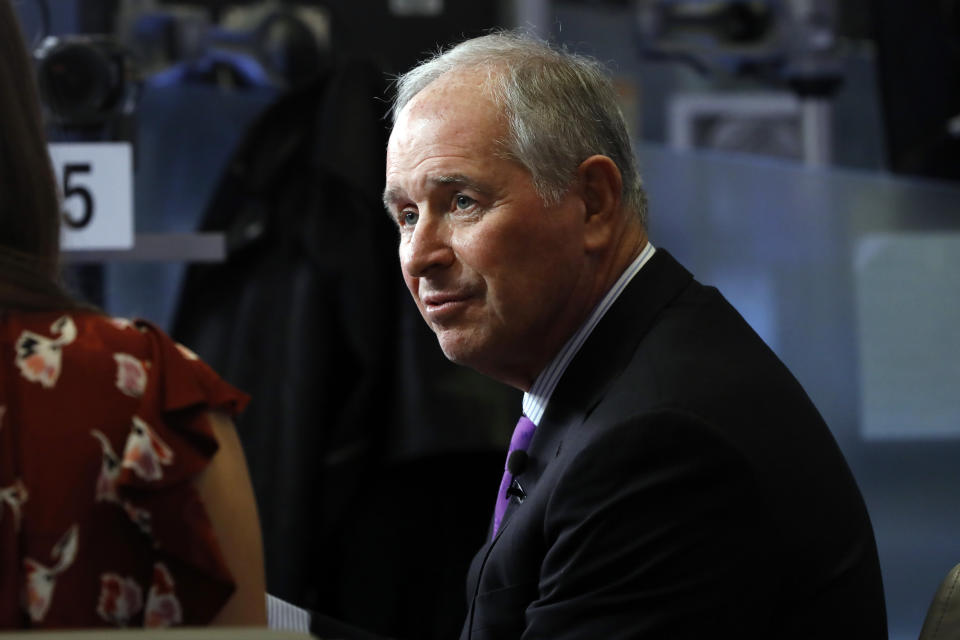Steve Schwarzman: Capitalism isn't broken, but the US education system is
Billionaire private equity chief Stephen A. Schwarzman believes that free market capitalism isn’t the main problem when it comes to inequality — but a broken U.S. education system is.
Raging cultural debates about income inequality and executive pay have eroded public support for capitalism, and led a growing number of wealthy individuals to speak out about the need for reform.
Yet Schwarzman has a different take. At the Yahoo Finance All Markets Summit in New York on Thursday, the CEO of The Blackstone Group (BX) explained that part of the underlying reason more Americans are becoming disenchanted with the current system is that around 40% can't write a $400 check in an emergency, according to a study from the Federal Reserve.
"What that means is this 40% of the population basically doesn't have savings,” he said. “And, they are having a really really tough time, which is why our politics has become poisonous because we've got a large percentage of our population that's not doing well. I think you have to address that," Schwarzman added.
Still, he insisted that capitalism "isn't broken per se. What's been broken is our educational system.”
The 72-year-old is also the product of a public school education at Abington High School in Pennsylvania, who later attended Yale for his undergraduate degree, then Harvard Business School.
When he was growing up as a public school student, the U.S. educational system was ranked among the best globally. Since that time, it's dropped significantly in the rankings compared to other countries, especially in mathematics.
"If you're producing a workforce that is dramatically inferior to competitors on the global scale, we're going to have a lot of trouble,” he told Yahoo Finance.
‘Not a recipe for success’

Schwarzman said he was in China a few weeks ago meeting with a top government official. In that conversation, it became increasingly clear that the U.S. educational system is lagging.
According to the billionaire, the Chinese official told him: “'You know what we are going to do in education?' We spent an hour on education. He said, 'We are going to require that every student in China take computer science.'“
He added: “And, I'm sitting there going, 'O.M.G.'"
Schwarzman noted that only around 5% of primary and secondary students are taking computer science at a time when technology is becoming integral to every sector of the economy.
"It is not capitalism that's broke,” he insisted.
“Imagine we are competing with a county where everybody is computer literate, and we've got hardly anybody. This is not a recipe for long-term success,” he said.
“And, it's not about capitalism. We have to put the best possible individuals and training on the playing field. That's how you win the game. We're just not doing what we need to do in that area,” Schwarzman added.
He added that these are government issues, but the business community can also step up to help train people.
"We have to make sure students who aren't necessarily on a college track do stuff like they do in Germany, where the business community trains those people for real jobs, takes them on board, and gives them good careers,” the CEO said.
“So, we have a lot of levers that we can play with to have better outcomes for the people in the country. We have to do that. This is not optional,” he stated.
The minimum wage dilemma
In terms of improving inequality, the billionaire said there are several policy approaches available to improve the lives of the working class. One option is a hike to the minimum wage to $15, a policy embraced by a number of politicians.
However, Schwarzman said that “is actually a tax on the business community, right. Because you're taking profits away from them to give to workers. That takes care of significantly increasing money for 15% of the population
Meanwhile, “what happens is the people who used to getting more than the minimum wage, they have to be boosted up, when you're close to doubling,” Schwarzman. “This ends up affecting somewhere around 35% of the population. And, it's got lots of knockoff effects."
Schwarzman, who built the world's largest private equity firm, is today listed as the 100th richest person in the world, with an estimated fortune of $18.4 billion, according to Forbes.
A year ago, Schwarzman made the largest-ever private donation to a public school, gifting $25 million to Abington High School. That donation was to specifically equip students with the right skills for jobs of the future by requiring that every student take regular classes in computer science and coding beginning in the seventh grade.
This year, he donated $350 million to Massachusetts Institute of Technology (MIT) to help found the Stephen A. Schwarzman College of Computing — his largest philanthropic gift ever. The goal is to help the U.S. be competitive in artificial intelligence and robotics.
Watch the full Schwarzman interview here >>
Julia La Roche is a finance reporter at Yahoo Finance. Follow her on Twitter.
